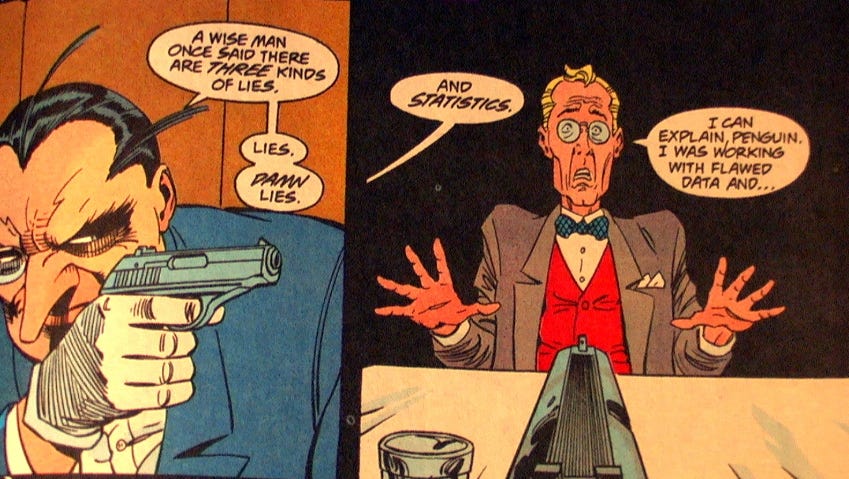Fifth day of Christmas 2020: FIVE GOLDEN RINGS!
Comparing crises, approximation inception, letters to the WSJ, Hell, and Batman
Obviously, I’m not doing all the 12 days of Christmas (only three and five so far), but I got a bit distracted while composing a Taxing Tuesday post and decided that California’s dumbass wealth tax idea can wait til 2021.
So let me be self-indulgent and share some of my writing from outside this blog!
Writing for actuarial publications
Okay, I’m not going to hit you with all my actuarial writings, just a couple.
My most recent article was for Risks & Rewards, the newsletter of the Investment Section of the Society of Actuaries.
Here it is: Is It Really Different This Time?
I reference Betteridge’s Law, Defoe’s Journal of the Plague Year, and whether mortality trends and economic factors are truly independent.
Here, have a table:
The intended audience for that article is investment-related actuaries, who may not have considered doing stress scenarios where both mortality and economic factors were stressed.
Some other items I’ve written for SOA publications:
An Influential Lesson From Old Ben: Borrow Books:
When Ben Franklin drops a secret on how to influence people, it pays to listen. Of all the Founders, he was the one best known for his persuasive powers.
…..
There are several lessons I’ve taken from this passage, not only with regard to borrowing books from people (though the important part, which many people forget, is giving the book back). One lesson Franklin specifically mentions: If you can, it helps to get people on your side, rather than seeking to get back at those who stood in your way.
Ben Franklin’s advice is useful to everybody. [and he did give the book back]
The nerdiest of my actuarial publications has to be this one, which I wrote in celebration of turning 40: Variations On Approximation – An Exploration in Calculation. It’s about estimating the distribution of the number of deaths among 2,000 40-year-old American females. Hey, we all have our ways of celebrating our birthdays.
There’s a downloadable spreadsheet (because of course there is), but also there was a meme gif the Society of Actuaries did not allow in the publication.
Here it is:
By the way, the SOA also did not allow me to publish “why pie charts suck”. Man, they’re such fuddy-duddies.
Intermittent hobby: writing letters to the editor
For a while, I had a hobby of writing letters to the editors of the Wall Street Journal. I managed to get multiple letters published, and they were invariably the bitchiest ones I wrote. I wrote other letters that were more detailed re: the content of their news pieces, and those did not get published. (I’m looking at you, Numbers Guy who is no longer at the WSJ)
As I noted to someone else, I was usually a trifle exhilarated when I wrote the letters that actually got published in the WSJ.
I think I captured all the published letters here in this livejournal post, and here are two I just re-read that made me laugh:
12 Feb 2011
If it makes Ms. Moses feel any better, there are tons of professions and industries that don’t give a darn where a person went to college. People with actual knowledge, abilities and achievements will do well, no matter if the institution from which they derived their credentials is lacking in prestige.
Given the unforgiving nature of the current business environment, I imagine the soft landing for the over-credentialed in uselessness will be in government positions where actual results don’t matter. May the Lord save us all from their supposed superiority.
Mary Pat Campbell
North Salem, N.Y.
And those were the people “in charge” this year. So funny, I’m crying.
But wait, there’s more:
3 Sept 2016
When I got to the end of “The Sinister Side of Cash” (Review, Aug. 27), I felt like I was in a Scooby-Doo episode, with the demasked villain proclaiming, “I would have been able to get monetary policy to work if it weren’t for those pesky kids and their cash!” It is farcical watching various central bankers persist in their failed strategies regarding negative interest rates without the subsequent desired results. As with Marxists claiming that true communism has never been tried, it looks like the current excuse for these bankers is that their strategy won’t work until cash is obliterated.
Mary Pat Campbell
Croton Falls, N.Y.
Yeah, there are more items at the link (look for the letter where I reference “machines that go ping”, which yes, I really got the WSJ to print.)
Oh, and I came in second place on a news quiz in 2009. Dammit, my sloth.
Modern View of Hell
I am a big lover of classic literature, and while I write about its relevance to business, I really just enjoy it for its own sake.
In college, I was required to take a literature class as part of my degree program. I took a class in Science Fiction for this requirement, and wrote my final paper on Larry Niven’s and Jerry Pournelle’s Inferno, a sci-fi take on Dante’s Inferno. I put it on my own website, and it was even republished by an academic group that collected Dante-related works.
Not sure how it came to their attention (I wrote the paper in 1995, before google existed), but Larry Niven corrected me on a detail (that I corrected) and re-published the paper at his website. I think part of it was that few people were interested in their Inferno compared to their other works, and that the type of people who liked reading Dante evidently looked down on their work.
Not me.
I appreciated some of the parallels they made as well as some distinctions. I wish they had attempted a book in Purgatory, instead of the sequel they did write (though they developed some interesting ideas in that one). There is a reason many people read Inferno, but not Purgatorio or Paradiso…. for Purgatory, you have to buy into Catholic theology more than you have to with Inferno (many of the people in Dante’s Inferno as objectively bad, Christian or not). But I think there is a lot to work with there — as I note in my paper on Niven & Pournelle’s Inferno, they essentially turned it into Purgatory, so no wonder they couldn’t do a book on that.
I’m awful at fiction, but if any sci-fi/fantasy writer would like to talk w/ me re: the rest of the Commedia, I would be very happy to (my email address: marypat.campbell@gmail.com). I think there’s a lot of good stuff you could do… not sure about Paradiso, that one would be the most difficult (because you need tension, and everybody is at their highest-energy-state while simultaneously being in their ground state, as it were (yeah, it’s been a long time since I was in physics, but I still think this way)).
My favorite part of the paper I wrote was an appendix where I argued the book was Science Fiction. The prof had considered it fantasy (he also taught a fantasy literature class), so he required me to do that bit if it were going to be my final paper.
This was my first argument:
On my Pocket Books edition, I see “Science Fiction” on the spine. So it’s science fiction.
[footnote: This is also known as the smart-ass response.]
It was followed by serious arguments, but really, sci-fi/fantasy/other genres are just marketing terms. I think Niven and Pournelle made it more like sci-fi than fantasy, and, unlike many of the critics who want to shove it into the fantasy realm, I do really think Hell, Purgatory, and Heaven all exist…. and are more real than [backwards] time travel and other standard sci-fi tropes.
The Batman villain… the Actuary!
Okay, this last item, I didn’t write. But this particular 2-comic-issue story cracks me up every time I re-read it. I’m going to spoil the whole story, so you have been warned. It’s still funny when you know the plot beforehand.
The Actuary shows up in Detective Comics issues 683 and 684, and let’s meet him!
Hey, client confidentiality is an important part of actuarial ethics.
So the Penguin meets The Actuary because the guy has been cleaning up at one of the Penguin’s casinos:
[I know a lot of gambling actuaries, and many actually do quite well… many have been high-rankers in the World Series of Poker, and I know an ex-actuary who does poker stuff full-time now.]
The super-smart Actuary notices that the Batman foils criminals … ONLY AT NIGHT!!!!
So the Actuary recommends that the Penguin do a hit at a big gardening expo in the middle of the day. [I suppose a bunch of rich people are supposed to be at this thing, but come on – it’ll be their gardeners checking out the goods]
But did I mention this expo isn’t taking place outside, but inside a giant domed area?
Batman not only gets the dome to close to provide the required dark, but also sets off the sprinkler system…. so it’s dark and rainy while he nabs the Penguin’s henchmen. I was cackling at this bit.
The Penguin is not pleased with the Actuary’s results:
Too often, actuaries are criticized for predicting the past, as we see with The Actuary here… but he still happened to be correct. Batman did strike at the bad guys in the dark.
So he was correct, but ultimately not useful. Man, the saga of the actuary. We gotta do better.
See ya!
The next post is likely to be mortality-related.
But til then….
Bye!










The Actuary forgot that correlation doesn't imply causality.